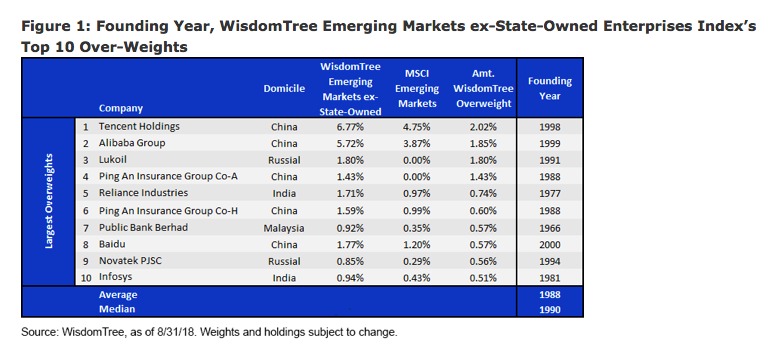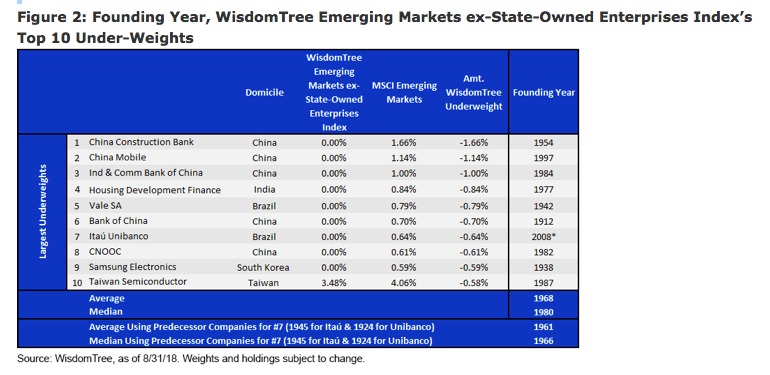Jeff Weniger, CFA, Asset Allocation Strategist, WisdomTree Asset Management
In the span of most of our lives, so many economic systems have turned on a dime.
Look at Poland, under the Soviet thumb as recently as three decades ago, graduating this month to “developed” status in FTSE Russell Indexes.
China, even after opening up upon Deng Xiaoping’s ascension to power in 1978, remained thoroughly Communist for years, really engaging freer market reforms only after its Tiananmen Square fiasco in 1989.

Business Models
But, in my opinion, the legacy of the old days leaves a tale of two business models:
- The state-owned variety, which typically places profits below political considerations; and
- The modern, profit-focused enterprises that, in many cases, were incorporated in more recent decades.
China
In my opinion, China is considered the worst offender when it comes to dominant state-controlled entities, but in my opinion the intrusion of government in listed companies is endemic across the emerging world.
Russia, India, Malaysia and many more are serial culprits in my view.
WisdomTree’s research of 1,000 emerging market companies found that about 300 of them had more than 20% of their equity owned by the government.
Xi Stocks
And when you put together investment strategies that cut those companies out, what comes together is a consortium of efficiently run, low-conflict-of-interest enterprises.
They are the “Xi Jinping stocks”—served up with some flaws, but the companies of this century nonetheless. Their counterparts are the “Chairman Mao” stocks.
Modernity
What is a key factor for determining if a company has heavy state ownership? Its founding year. The monoliths were in most cases created when prior-era rulers, dictators, autocrats, communists created a government-run company.
In contrast, many of the companies with zero state ownership never met Chairman Mao or Leonid Brezhnev.
Profit Focus
In other words, in my view, the big state-owned companies were arms of the government for so long that many never learned how to focus on the income statement.
Kick them out and in my opinion, you have an index that naturally melts up on multiple intuitive metrics.
The list is deep: projected earnings growth, profitability, propensity to grow the dividend, willingness to sack unneeded workers, promotions based on merit and so forth.
Strivers
You create a basket of companies that strive for excellence, not a bucket of Goliaths whose business ventures may have a long list of negative net present value political projects.

Figure 1 shows the largest over-weights in the WisdomTree Emerging Markets ex-State-Owned Enterprises Index.
For example, this index has 6.77% in Tencent, making it 2.02% over-weight compared to its 4.75% allocation in the MSCI Emerging Markets Index.
Notice that many of this WisdomTree index’s major over-weights were founded in the modern era—after China’s 1978 opening and, of course, near or after the 1989 Berlin Wall/Tiananmen exacta.

Figure 2 tells an opposite story, the story of the companies that WisdomTree’s Index shuns the most compared to MSCI Emerging Markets weights.
For example, its largest under-weight, China Construction Bank, is a “vintage” 1954 firm.
Considerations
WisdomTree has seven broad emerging market ETFs and two that are China-specific.
For investors who are keen to focus on the future of the developing world, the WisdomTree Emerging Markets ex-State-Owned Enterprises Index, tracked by the WisdomTree Emerging Markets ex-State-Owned Enterprises Fund (XSOE), is trading for 13.9x forward earnings and has a dividend yield of 2.2%.3
In contrast, perhaps our deepest value emerging market ETF, the WisdomTree Emerging Markets High Dividend Fund (DEM), tracks the WisdomTree Emerging Markets High Dividend Index.
That Index is down to 9.0x forward earnings and has a 5.3% dividend. Being deep value, a trade-off for having single-digit price-to-earnings (P/E) ratios, is a natural inclusion of state-owned firms.
Trade War
There is something else that investors may want to think about: the so-called “global trade war.”
Although we have expressed skepticism with respect to its severity in recent blog posts and reports, investors with strong opinions either way can use XSOE and DEM, depending on which side their outlook lies.
To the extent that Chinese state-run banks and industrials are more China-focused, I think they may be more insulated from a deep trade rift with the U.S.
That favors DEM. For investors on the other side of sentiment, who anticipate trade conflict resolution or who simply see emerging equities as a contrarian buy opportunity, the non-state-run companies could be the angle.
In my opinion that favors XSOE, which has been pummeled 17.5% since January 26, 2018.4
China Plays
For dedicated China ETFs, a parallel to these concepts is the battle between the S&P China 500 Index and the WisdomTree China ex-State-Owned Enterprises Index.
Their respective WisdomTree ETFs are the WisdomTree ICBCCS S&P China 500 Fund (WCHN) and the WisdomTree China ex-State-Owned Enterprises Fund (CXSE).
Versions of this article first appeared on SeekingAlpha and the WisdomTree blog on October 8, 2018.
Photo Credit: Chiu Ho-yang via Flickr Creative Commons
Important Risks Related to this Article
There are risks associated with investing, including possible loss of principal. Foreign investing involves special risks, such as risk of loss from currency fluctuation or political or economic uncertainty. Some of the Funds discussed in this article focus their investments in China, including A-shares, which include risk of the RQFII regime and Stock Connect program, thereby increasing the impact of events and developments associated with the region, which can adversely affect performance. Investments in emerging or offshore markets are generally less liquid and less efficient than investments in developed markets and are subject to additional risks, such as risks of adverse governmental regulation and intervention or political developments. The Funds’ exposure to certain sectors may increase their vulnerability to any single economic or regulatory development related to such sector. As these Funds can have a high concentration in some issuers, the Funds can be adversely impacted by changes affecting those issuers. These Funds will be required to include cash as part of their redemption proceeds, which introduces additional risks, particularly due to the potential volatility in the Chinese market and market closures. The Funds invest in the securities included in, or representative of, their Indexes regardless of their investment merit, and the Funds do not attempt to outperform their Indexes or take defensive positions in declining markets. Due to the investment strategy of these Funds, they may make higher capital gain distributions than other ETFs. Please read each Fund’s prospectus for specific details regarding the Fund’s risk profile. You cannot invest directly in an index.
Foreign investing involves currency, political and economic risk. Funds focusing on a single country, sector and/or funds that emphasize investments in smaller companies may experience greater price volatility. Investments in emerging markets, real estate, currency, fixed income and alternative investments include additional risks. Certain of the information contained in this article is based upon forward-looking statements, information and opinions, including descriptions of anticipated market changes and expectations of future activity. WisdomTree believes that such statements, information, and opinions are based upon reasonable estimates and assumptions. However, forward-looking statements, information and opinions are inherently uncertain and actual events or results may differ materially from those reflected in the forward-looking statements. Therefore, undue reliance should not be placed on such forward-looking statements, information and opinions.
About the Author: Jeff Weniger, CFA, is an Asset Allocation Strategist at WisdomTree Asset Management Canada, Inc. Jeff has a background in fundamental, economic and behavioral analysis for strategic and tactical asset allocation. Prior to joining WisdomTree, he was Director, Senior Strategist with at BMO Asset Management Corp. from 2006 to 2017, serving on the Asset Allocation Committee and co-managing the firm’s ETF model portfolios.

